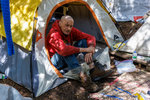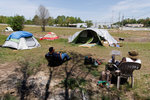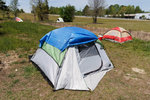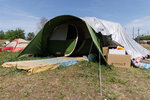



The sun was starting to set through the woodline. A cool breeze whipped through as the swollen sky threatened rain.
Occasionally, a passer-by honked his horn and at least one of the three men who sat together on folding seats and a weathered black leather gaming chair off Gillespie Street at the Martin Luther King Jr. Freeway would wave.
The men make their homes in small tents pitched not too far from the bustle of downtown Fayetteville.
Mike, 49 -- the talker of the bunch -- is originally from Philadelphia. Some of his family is from Fayetteville.
Alex, 30, was born and raised in Fayetteville. He returned after being released from prison.
David, 41, also grew up in Fayetteville and returned after spending time in prison.
The men, who did not want to have their last names used, are among the homeless who make do in one of the tent cities, or encampments, scattered around town and in Cumberland County.
Some city officials and homeless advocates say they have seen an increase in the number of encampments around town.
During Monday night’s work session, the Fayetteville City Council is expected to receive an update on the Homeless Encampment Task Force. The council is expected to discuss research by the task force and recommendations related to encampments and camping on public and private property.
“Of course, you have the compassionate part in terms of what you can do to help people,” Mayor Mitch Colvin said this week. “Collectively, we know that’s not a longer-term situation. We cannot allow people to live in danger and live close to our highways. Many are on DOT property. We spoke with DOT from the local ordinance perspective.
“We have to get those people moved closer to services. They can’t sit on the highway,” Colvin said.
The mayor said the City Council will hear from representatives of the City of Fayetteville Community Development and the city’s legal team regarding the city’s options in hopes of eradicating what he sees as a public safety problem.
“This is how we think we can do it to help receive support services,” Colvin said. “I’ve noticed other communities are dealing with that. I’ve seen it all over. I saw it in Washington, D.C., and other cities where they have had to move homeless from off the side of the road.”
Encampments more visible
Mike, Alex and David estimate that as many as 10 people live in tents near the Gillespie Street exit off the Martin Luther King Jr. Freeway.
They may be homeless, but all three say they have cellphones. None has a computer.
“I just got out of prison last week,” Alex said recently. “A sheriff’s deputy told me I would have a halfway house after I was released. He said, ‘Be good; get off drugs.’ But they told me when I was being released to go live under a bridge.
“I cried. I’m serious, I cried,” he said. “I’ve seen more help from strangers than I have my own family. A lot of people think (the homeless) are all bad. I come out and talk so they’ll know we don’t drink and do drugs.”
Craig Morrison is executive director of the Fayetteville Area Operation Inasmuch, which feeds the destitute a hot breakfast daily. He replaced longtime director Sue Byrd two years ago.
“Yes, they have become more visible,” Morrison, 44, said of the growing number of encampments for the homeless. “There are several reasons. One of those reasons is the number of people who are homeless who have been asked to leave places under the bridges and by railroad tracks.”
Another reason, he cited, is that a moratorium on evictions, prompted by the economic stress of the COVID-19 pandemic, has been lifted.
Morrison said Fayetteville is “a very generous community, a very caring community. You obviously see folks hurting, and one of the basic instincts is to help somebody. Out of a good place, a good heart, we want to help people. One of the quickest and easiest ways is to help with food.”
While Operation Inasmuch provides the homeless with breakfast, Manna Church Dream Center serves them lunch and the Salvation Army offers a hot dinner.
“Besides those,” said Morrison, “there are also any number of organizations giving out food.”
Fayetteville City Councilman Antonio Jones said he doesn't like to see anyone unsheltered.
"Honestly," he said, "at first, it tugs at my heart. My first reaction is, what can we do to get them shelter? I know it's a bigger issue than building shelters. If I were on the council or not, what can we do? Those people are my brothers and sisters. We're concerned about their safety. We need to respect and do what we can do to help them. I know it's not quick. But I think we've got to get it started."
Like the mayor, City Manager Doug Hewett said the tent cities typically crop up on state Department of Transportation property or, in other cases, on private property. The city works with property owners to keep the number in check.
“We understand that people in those tents are homeless,” Hewett said. “That is someone’s family. We try to make sure we have resources to offer the person and not just say, ‘You need to move.’ ”
“It is on our radar,” he said.
City, county projects in the works
The city is pursuing a day center at 128 S. King St., and Cumberland County is looking into establishing a homeless shelter.
“The city has the money to do the building and move that forward,” city spokeswoman Jodi Phelps said Friday.
The estimated cost of the facility would be nearly $6 million. The invitation to bid for construction is already out, she said. The earliest the proposed day center would open is spring 2023.
The South King Street facility would support and centralize resources and bring in community partners for other services to help those who are homeless and those who are at risk of living on the streets.
Fayetteville partnered with Manna Church on a men’s shelter that had a ribbon-cutting in February at 913 Person St. The Manna Dream Center Shelter has a limited capacity for overnight stays for men, and the clients also receive referrals to mental health services, employment and permanent housing.
Colvin said city and county plans for the homeless provide two different functions.
“The people need services and support to get out of the situation,” Colvin said. “To bathe, wash clothes, get a haircut, IDs. The day center is set up for that. The overnight sheltering – they decided to do that. I think what we’re doing complements one another.”
Cape Fear Valley Health has expressed its intent to partner with the county to build the homeless shelter. The county is looking to find an agent who will represent the board in its search for a location for the planned homeless shelter.
As of March 14, the county had yet to determine the capacity for the shelter.
Colvin said he doesn’t think homelessness will ever be completely eradicated.
“I don’t know of any community that has figured that out,” he said. “You set up the infrastructure for people in transition to fall back from that situation. There are great community nonprofits in that space.”
As for the coordination of services for the homeless, he said, “That’s the city’s job. All we can do is reduce it and shorten the time people are in that situation.”
Colvin said the problem has been exacerbated in Fayetteville due to a number of reasons, including those impacted in the community by COVID-19 and homeless people who are bused here from other communities and end up staying.
Councilwoman Yvonne Kinston said she has seen those who are homeless moving further from downtown into other areas. “It’s a need that we have to address,” she said.
“The homeless are out there. They’ve got to have shelter over their heads,” Kinston said Friday. “I understand that some don’t want to go indoors.”
She sees the solution as working in partnership with the county.
“Everyone should see it as a serious concern,” she said. “It’s a citywide issue. We just need to be proactive and determine the overall availability of services that are now out there for the homeless. We need to determine what the gaps are.”
‘This is my home’
Chris Cauley, director of economic and community development for the city, said community development funds are available to help low- and moderate-income people, including the homeless.
The city conducted its homeless count for 2022 on Jan. 26. Those numbers are not yet available.
The city’s homeless count was 329 in 2019, Cauley said, adding that single men outnumber single women in the tally. Mental health is a major concern among the homeless, he said.
“Homelessness looks very different from just the gal and guy living off the streets,” Cauley said. “There’s a lot of homelessness with different looks.”
Affordable housing and transitional housing are keys to reducing the number of homeless people, Cauley said.
Hewett cites COVID-19 as one reason the homeless may have become more visible. Some services were suspended during the height of the pandemic.
“There were Port-a-Johns and handwashing stations in the areas where we have homeless people congregate,” Hewett said. “And now we see that some of the tents are springing up near where we have those handwashing stations and Port-a-Johns.”
Mike said he has lived at the Gillespie Street camp for five months. He and others there have access to one of those portable restrooms.
The local homeless are well-fed, he said, noting that he has a cooler full of meats that were handed out by churches and food caterers.
“This is a first-time experience for me,” Mike said while smoking a cigarette.
He said he served nine months in prison for a resisting-arrest charge. He hoped to leave Fayetteville in April.
“I’ve got a place set up out of town,” he said. “I have always had a place. Always.”
“What really pulled me through it was God,” he said. “We get up in the morning and read the Bible.”
When Alex showed up, Mike said, he helped him get settled, giving him a tent and a sleeping bag.
“This man is an angel,” Alex said of Mike.
David said he has been homeless about 18 months. He has lived in a tent across a ditch from Mike and Alex for nearly a year.
“I’m near the end of my road,” he said. “I got something lined up.”
The three say Fayetteville should provide more services for the homeless. David said cities such as Raleigh and Charlotte offer more help to those who live on the streets.
Military veterans are a key segment of the homeless population in Fayetteville, Cauley said.
Danny Smith and Davey John – who did not provide his last name – are among the veterans living off the grid. They have an encampment near the railroad tracks in the downtown area that is well hidden by tarps and other coverings, as well as a natural growth of trees and thick shrubbery. The area is littered with plastic foam containers, cans, bottles and wood pallets.
Smith, 57, was in the Army; Davey John, 66, served in the Marine Corps.
The solution to homelessness, the men agreed, is to provide housing -- both permanent and transitional. They said food is no problem since so many organizations provide meals.
Smith cooks at their encampment, too.
“I can take a can of beans and Vienna sausages and make a gourmet meal,” he said.
Davey John, who said he had been homeless for 26 weeks, shares his tent with Roscoe P. Coltrane, a scraggly white-and-silver-bearded dog. Davey John had a hardback copy of the W.E.B. Griffin novel “By Order of the President” by his side in his tent. Griffin is one of his favorite writers, he said. He found the book in the trash at a public library.
“Well, you need some kind of entertainment out here,” he said.
“I’m not a panhandler,” Davey John said. “I just look pitiful, and people give me money.”
Smith said he had been experiencing “teepee living” for about a week.
“I want to get off this hard, cold ground. I’ve got a bad, bad, bad neck.”
He blamed his latest bout with homelessness on an increase in monthly rent for the place where he had lived for a couple of years.
As it started to get dark, Smith took a long gulp from a bottle of vodka that was wrapped in a trash bag. He laid back in his tent and grew silent.
Davey John said, “We don’t have to worry about people. We have this place. They’re driving all the homeless out of the downtown. I’ve been here five years now, dude. This is my home.”
Jones, the City Council member, called the entire process challenging.
"We have to do something," he said. "We think we're heading in the right direction. Even partnering with the county on this effort."
Michael Futch covers Fayetteville and education for CityView TODAY. He can be reached at mfutch@cityviewnc.com. Have a news tip? Email news@CityViewTODAY.com.